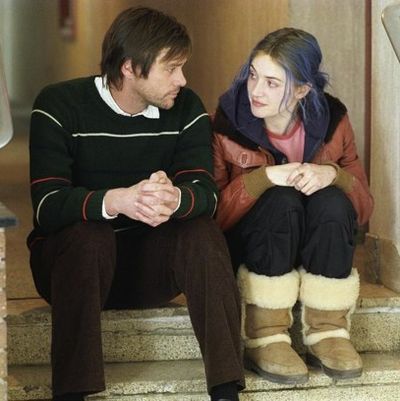
Reach into your memory banks and try to grab hold of the first time you saw Eternal Sunshine of the Spotless Mind. You may have to go back further than you thought, because the mind-bending Jim Carrey/Kate Winslet romance, directed by Michel Gondry and scripted by Charlie Kaufman, was released ten years ago today. (Consider this another installment in the ongoing Vulture series You Are Old Now.)
Unlike the memories scrubbed by its central company, Lacuna Inc., which crumble and depreciate into nothingness, Eternal Sunshine’s reputation has only matured since its release in 2004, and the film showed up on several best-of-the-decade lists a few years back. It’s hard to believe now that Eternal Sunshine was nominated for only two Oscars (one of which, Best Original Screenplay, it won), but you can feel its influence in all sorts of ways today, most especially in last December’s Her, directed by Kaufman’s frequent collaborator Spike Jonze. Both Eternal Sunshine and Her ground their future tech and bittersweet romance in a persuasively lived-in world, and both topped out at $34 million, clearly destined for a much more meaningful afterlife on home video.
About that afterlife: When I revisited Eternal Sunshine last month, I expected the tempestuous relationship between Carrey and Winslet to take on new significance now that I’d had ten years to accrue romantic experience and heartbreak in equal measure. What surprised me, though, is how devastating I found Kirsten Dunst’s arc to be this time around. Her character is a sweet, open-faced twentysomething with a crush on her boss that’s both long-nurtured (she’s collected philosophical quotes that she hopes will impress him) and barely thought through (since her boss has a wife). When she finally makes a move on the man, he gives in, but is then forced to tell her that they’ve had this affair once before; in fact, it was so destructive that they had to wipe her memory of it. The moment that a disbelieving Dunst finds her intake tape and doubles over as she hears the experienced, tired, broken-down voice — her own — coming out of the recorder … well, it’s positively brutal. It’s a past she’s forgotten she lived and proof positive of a future she can’t believe she’d ever succumb to. Her now-lost naïveté was a young person’s shield, keeping the compromises to come at bay.
And it makes the final scenes between Carrey and Winslet all the more poignant. The most enduring movie romances are the ones that end tragically, with the protagonists torn apart by circumstance, knowing they can never be together. Eternal Sunshine confronts that idea head-on, then swerves: When the embittered Dunst sends Carrey and Winslet their own intake tapes just as the lovers are unknowingly embarking on a repeat fling, they are confronted by the onetime end of their relationship and must figure out whether it’s worth going down that road again. Someday, the initial glow of meeting will wear off, and they’ll become like the carping exes on the tapes, unable to see past each other’s faults and desperate to erase each other out of existence. You couldn’t blame them for going their separate ways right then and there, since it’s hard to get started on falling in love when doom is staring you square in the face.
But they decide to do it anyway. “Okay,” he says. “Okay,” she replies. They’ve learned the worst things about each other, their faults and fears, and yet standing across from each other in the hallway, they can’t help but smile, thinking, We can make this work. That’s real life. That’s real love. What could possibly be more romantic?

